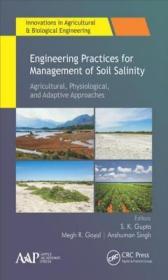
现货 Engineering Practices for Management of Soil Salinity: Agricultural, Physiological, and Adaptive Approaches (Innovations in Agricultural & Biological Engineerin[9781771886765]
¥ 1402 九五品
仅1件
作者Gupta, S K ; Goyal, Megh R ; Singh, Anshuman
出版社Apple Academic Press
ISBN9781771886765
出版时间2018-09
装帧精装
纸张其他
页数420页
正文语种英语
上书时间2023-04-10
- 最新上架
商品详情
- 品相描述:九五品
- 商品描述
- Abiotic stresses are known to adversely impact agricultural productivity on millions of hectares globally, and it is projected that these problems are likely to increase, primarily due to anthropogenic interventions as well as climatic changes. Understanding abiotic stresses―especially salt stress on soil―calls for an interdisciplinary approach because salt-stressed soils need hydro-technical, chemical, and agronomic interventions as well as an understanding of plant response when exposed to these stresses. This volume, Engineering Practices for Management of Soil Salinity, explores and conveys the latest information on emerging technologies in the management of abiotic salt stress and their field applications. It brings together experts from various disciplines (academia, technology, and engineering) to provide the latest information and knowledge on this important challenge. The volume includes some of the latest information on field practices for soil reclamation from the disciplines of soil science, agronomy, and engineering. The plant adaptation studies presented in the book encompass the work done by physiologists, plant breeders, biochemists, and genetics. The potential of many crops, such as halophytes and seed spices, is discussed by experts. And topics span both conventional and nonconventional crops in arid, semi-arid, and coastal ecology. The book covers: - management of saline/sodic stress: field practices - physiological and molecular innovations to enhance salt tolerance - adaptations and screening of plants under water logging and salinity stresses - nonconventional and high-value crops for salt affected lands The volume addresses a wide range of issues on the management of soil salinity and will be of interest and value to the researchers, teachers, students, and field practitioners in many fields
相关推荐
-

现货 Engineering Chemistry
九五品吉安
¥ 738.40
-
![现货 Traffic Engineering[9780134599717]](https://www0.kfzimg.com/sw/kfz-cos/kfzimg/17733071/f5474bb30fb7467f_s.jpg)
现货 Traffic Engineering[9780134599717]
九五品上海
¥ 2791.00
-
![现货 Osmosis Engineering[9780128210161]](https://www0.kfzimg.com/sw/kfz-cos/kfzimg/17733071/57edf36f828232c5_s.jpg)
现货 Osmosis Engineering[9780128210161]
九五品上海
¥ 1851.00
-
![现货Aquaculture Engineering[9781119489016]](https://www0.kfzimg.com/sw/kfz-cos/kfzimg/17733071/34e00b7f6db8f4b8_s.jpg)
现货Aquaculture Engineering[9781119489016]
九五品上海
¥ 2309.00
-
![现货Engineering Electromagnetics[9780078028151]](https://www0.kfzimg.com/sw/kfz-cos/kfzimg/17733071/6eb39ec62344af14_s.jpg)
现货Engineering Electromagnetics[9780078028151]
九五品上海
¥ 2005.00
-
![现货Biomedical Engineering[9789814877633]](https://www0.kfzimg.com/sw/kfz-cos/kfzimg/17733071/3fdab492febaf82c_s.jpg)
现货Biomedical Engineering[9789814877633]
九五品上海
¥ 1231.00
-
![现货Maintenance Engineering[9788122443530]](https://www0.kfzimg.com/sw/kfz-cos/kfzimg/17733071/c3b4cf7e2c03ca1a_s.jpg)
现货Maintenance Engineering[9788122443530]
九五品上海
¥ 168.00
-
![现货Engineering Hydrology[9780367200558]](https://www0.kfzimg.com/sw/kfz-cos/kfzimg/17733071/f68614f308149e76_s.jpg)
现货Engineering Hydrology[9780367200558]
九五品上海
¥ 1502.00
-
![现货Human Engineering[9781163193587]](https://www0.kfzimg.com/sw/kfz-cos/kfzimg/17733071/0ddf89f56528a144_s.jpg)
现货Human Engineering[9781163193587]
九五品上海
¥ 142.00
-
![现货Forensic Engineering[9780128027189]](https://www0.kfzimg.com/sw/kfz-cos/kfzimg/17733071/638ca687546cf10b_s.jpg)
现货Forensic Engineering[9780128027189]
九五品上海
¥ 842.00
— 没有更多了 —
![现货 Engineering Practices for Management of Soil Salinity: Agricultural, Physiological, and Adaptive Approaches (Innovations in Agricultural & Biological Engineerin[9781771886765]](https://www0.kfzimg.com/sw/kfz-cos/kfzimg/17733071/abadee1cc0f06b1f_b.jpg)

![现货Materials and Technologies of Modern Production[9783036401683]](https://www0.kfzimg.com/sw/kfz-cos/kfzimg/17733071/5fd2824531e165d7_s.jpg)
![现货Introduction to Container Ship Operations and Onboard Safety[9781032155425]](https://www0.kfzimg.com/sw/kfz-cos/kfzimg/17733071/58b7ff43ef7909ee_s.jpg)
![现货Electrophosphorescent Materials and Devices[9789814877343]](https://www0.kfzimg.com/sw/kfz-cos/kfzimg/17733071/18cc1d77bcb7b488_s.jpg)
![现货Organic Semiconductors for Optoelectronics[9781119146100]](https://www0.kfzimg.com/sw/kfz-cos/kfzimg/17733071/24c85a750c708964_s.jpg)
![现货Advances in Food Rheology and Its Applications[9780081004319]](https://www0.kfzimg.com/sw/kfz-cos/kfzimg/17733071/e0c11603c9119d4d_s.jpg)
![现货Advanced Materials and Sustainable Technologies[9783035727562]](https://www0.kfzimg.com/sw/kfz-cos/kfzimg/17733071/dced675333874c48_s.jpg)
![现货Advanced Materials and Manufacturing Engineering II[9783035712681]](https://www0.kfzimg.com/sw/kfz-cos/kfzimg/17733071/660ccfae75fa8d3e_s.jpg)
![现货Materials in Machinery and Construction[9783035718119]](https://www0.kfzimg.com/sw/kfz-cos/kfzimg/17733071/6f402060775e9daa_s.jpg)
![现货Cereal Grain Quality (Softcover Reprint of the Original 1st 1996)[9789401071772]](https://www0.kfzimg.com/sw/kfz-cos/kfzimg/17733071/f93ca1c96a97403a_s.jpg)
![现货 Engineering Practices for Management of Soil Salinity: Agricultural, Physiological, and Adaptive Approaches (Innovations in Agricultural & Biological Engineerin[9781771886765]](/dist/img/error.jpg)
以下为对购买帮助不大的评价